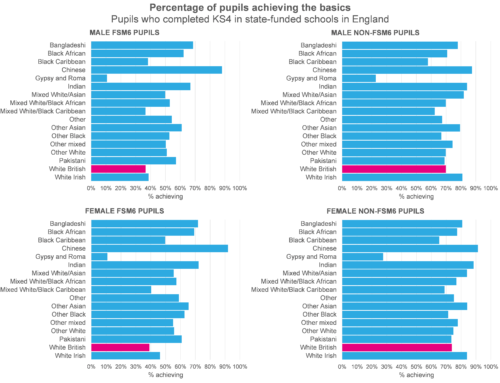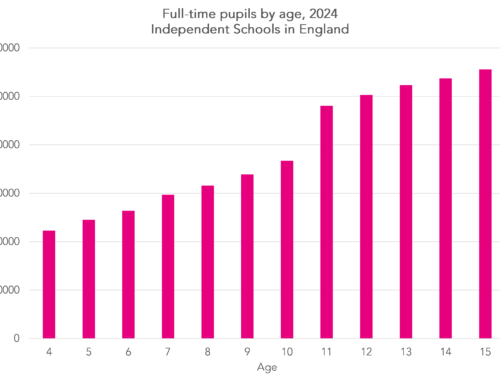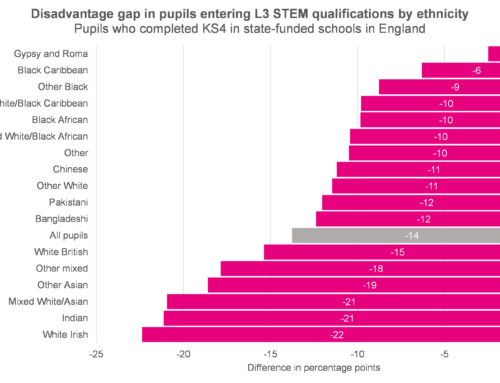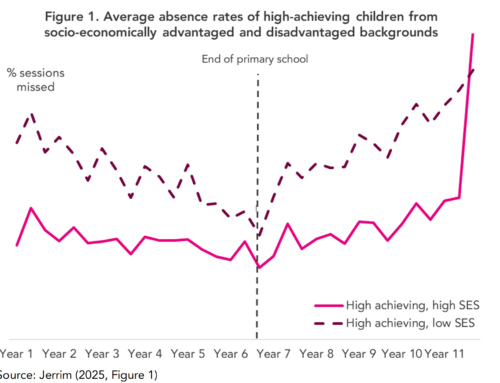The arguments for and against grammar schools are well rehearsed. Grammar schools provide a good education for those who get to attend – I think the best guess in the literature is that they experience gains in the order of 1 grade in 4 of their best 8 GCSE exams. This isn’t a huge impact, but it hard for a grammar school to transform the life of a middle class high achiever who is likely to succeed in any educational setting. Secondary moderns do well in difficult circumstances and the damage children experience through failing the 11+ in a selective system might only amount to 1 grade in 1 of their best 8 GCSE exams. But there are three or four times as many children in the secondary moderns as there are in the grammar schools so we have to take this negative experience seriously.
If the Sevenoaks annexe does open providing 450 new grammar school places, who actually gets to experience this grammar school education? This is what the data suggests:
I doubt we’ll see much of an increase in the number of Sevenoaks children going to a grammar
About a third of the boys and girls who go to state-funded primary schools in Sevenoaks currently pass the 11+ and go to a grammar school. They do so by getting into buses and cars and driving 9 miles down the road to Tonbridge or Tunbridge Wells. I’m sure many of the parents of these girls will be happy to risk sending their child to an unproven new grammar school to save themselves this journey.
Some of those in Sevenoaks who currently attend non-selective state schools might be given a place at the new grammar, but for the school this means consciously dropping down the hierarchy of grammar school desirability.
We may see some drift from the private sector back into state schools
About 1-in-10 of those attending state primaries in Sevenoaks go to private secondary schools. For many they will have failed the 11+ and I think it is unlikely a grammar school would want to lower entry standards to receive them. But for a small minority they passed the 11+ but their parents decided a local private school was preferable to a state grammar many miles away. So the new grammar will create difficulties for the private schools in Sevenoaks.
Nationally the interplay between private and selective systems is complex. In Kent, we estimate that 13% of children attended a private primary school (on the basis that we know they weren’t in a state school); nationally this figure is 15%.
Weald of Kent School will have a choice: lower the selection criteria for local west Kent children or accept smart pupils from further afield
The Sevenoaks annexe will free up some new grammar school places for girls in west Kent, in Sevenoaks itself and in the places in Tonbridge/Tunbridge Wells that the Sevenoaks residents vacate. Admissions policies for these schools are complicated – those living locally require a lower pass mark to be accepted than those living further away. So, the schools face a choice – will they lower their pass mark and make room for local children who would otherwise attend secondary moderns? Or will they maintain a higher pass mark and open more places for children living further afield? West Kent, and Sevenoaks in particular, is commuter territory so it is not difficult for thousands of south London children to make the reverse commute into these grammar schools. I am sure there is plenty of demand for places from these families.
This risks damaging intact non-selective systems in neighbouring local authorities, particularly the Sussex local authorities. Already in Kent, 7 percent of those attending grammar schools cross a local authority border to reach the school each day and obviously that figure is much high in west and north Kent. Nationally, 1-in-4 pupils make this cross-local authority journey.
However the grammars decide to adjust their admissions criteria, it seems unlikely that many children from low income families will get a place
If we take two children with identical test scores at the end of primary SATs tests, the one who is eligible for free school meals is about half as likely to get a place at a grammar school. Advantages are gained through test preparation with well-educated parents, with private tutors or in private primary schools. Attempts to devise ‘tutor proof’ tests in places such as Buckinghamshire haven’t succeeded.






[…] since significant numbers of the highest attaining pupils are migrating to grammar schools. The opening of a new grammar school annex at Sevenoaks, within walking distance of mainline stations, is likely to increase these […]